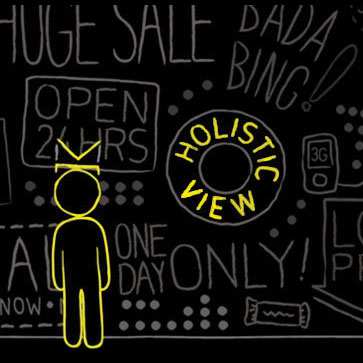Contextual Ad Face-Off

Google has been the undisputed leader in search and Internet advertising for what seems like forever, and despite the many fruitless attempts to challenge their dominance, they remain at the top (although many expect Facebook to make a big run in the near future thanks to its new ad exchange FBX).
However, a new union of Google's biggest rivals may finally pose a threat to AdSense. Media.net has brought together Microsoft's Bing search engine and its tenuous ally Yahoo to create Yahoo Bing Network Contextual Ads, which, like AdSense, will offer contextually-relevant text-based ads on websites. And the best part is that these ads come from all of the advertisers that are already buying millions of search ad impressions on Yahoo and Bing through the Yahoo Bing Network (YBN).
But plenty has already been written about the details of YBN Contextual Ads, but that doesn't answer the big question on everyone's minds: Just how do they stack up to AdSense?
Getting Started
If you want to partner with AdSense, you have to create an account with Google, but first, it's important that you have a website or content to monetize that meets the AdSense program policies. You will have to submit the website or URL to Google, and not following these guidelines will get your account disabled, and that means a lifetime ban from AdSense. These terms include adult or violent content, material that encourages illicit drug use or gambling, excessive profanity and much more. After that, you'll have to fill out the AdSense application, which allows you to sign up as either an individual or a business and requires you to submit a physical street address (where it can send your payments). Once you've been granted approval by Google, you receive the AdSense source code that you can implement on your website or content pages; then Google will conduct a final review and you're off to the races.
Jumping into YBN Contextual Ads is a bit trickier, because it is currently in beta and limiting the number of accounts that it issues each day, with priority given to sites with a high advertiser demand. Plus, Media.net does screen websites to sure they meet "high-quality standards." This means they must have high-quality content and traffic, including already having a "reasonable amount" of visitors using the site that are primarily from the U.S., U.K. or Canada. The network also asks that the site's primary language is English, and that its content abides by Media.net's program guidelines (which are mostly the same as Google's). Like AdSense, the process becomes significantly simpler once your application is approved, as you'll just have to paste the HTML that Media.net provides you with into your Web pages' source code.
Benefits for Publishers
Content publishers can put Google AdSense ads on their websites, mobile sites and site search results. Google promises these partners high-quality, relevant ads for their content from a pool of millions of advertisers, which results in more revenue for the publisher. However, just to be safe, they also have control over the types of ads that can appear on their content pages. AdSense will also provide them with detailed reports that highlight key metrics and offer useful insights into how well their ads are performing. All of this comes with no contract, so publishers don't have to worry about long-term commitments if AdSense isn't working for them.
YBN offers millions of ads and ad topics that can help publishers monetize their content, as the network has one of the largest bases of keyword-targeted advertisers on the net, including major global brands and digital ad agencies. This cuts out a lot of the middle man between these publishers and their advertising partners. Such a large base means that YBN has a plethora of ads to choose from, so they can ensure you'll get highly relevant ads that will enhance the user experience, and since they're simple text-based ads, they'll also reduce clutter on your website or content pages. Finally, you can tap into Media.net's team of ad specialists to receive support and personalized attention from real people.
Benefits for Advertisers
AdSense provides different advertising experiences for publishers based on their size and experience. You can sign up as either a New, Experienced or Global advertiser to achieve your marketing goals. Google offers the support necessary to help you build brand awareness, engage your target audience, launch a product or service, drive online sales and/or increase traffic, depending on what you want to accomplish as an advertiser. For those that are especially new, as in you don't even have a website yet, Google also offers AdSense Express, which can be set up in under ten minuets and features standard tracking and performance tools, as well as automated campaign management. Larger global advertisers can operate internationally and connect locally through the AdSense network, using the service to find new markets, translate their website and ads into their customer's language (which includes localized customer support) and more, such as help with international shipping, customers, insurance and electronic payments.
For YBN, the big appeal seems to be that they're very scrupulous in their selection of advertising partners, which is part of why it's operating as an invite-only service for the time being. The program claims to be built "exclusively for top-quality content publishers" of all sizes. Premium content means that it will generate more clicks, traffics and conversions for advertisers, thus increasing their ROI and making their campaigns more effective.
YBN Contextual Ads may be the greatest threat to date to AdSense's dominance in the field, but it's still unproven for now. However, if this face-off is any indication, that may not be the case for long.
As an advertiser OR publisher, do you have a preference for either program? Let us know in the comments!









